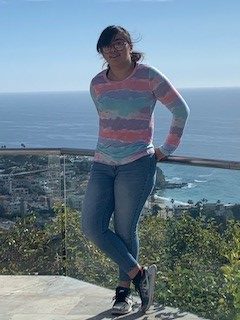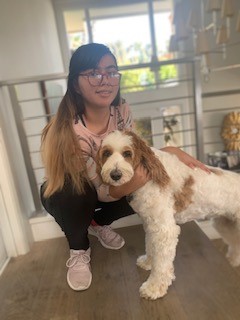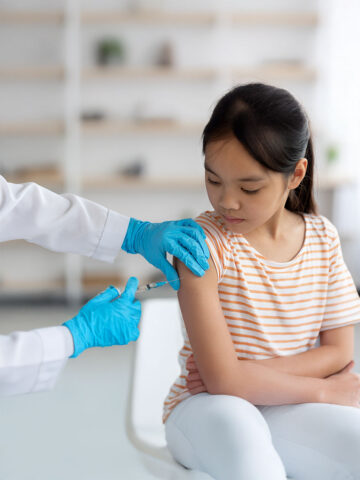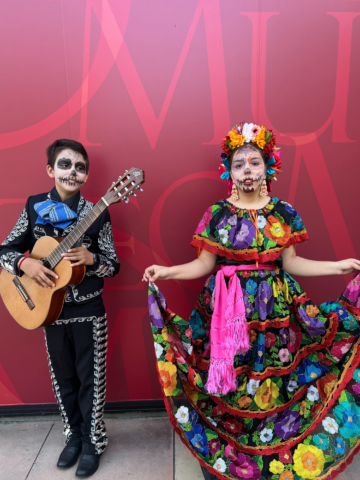Vivian Villamil, 14, earns solid grades and especially loves her art class. Outside of school, the eighth-grader enjoys attending weekly Bible study and spending time with her two half-sisters, Lianna, 4, and Adelynn, 1.
While her mother, Leticia, works during the day, Vivian is a big help around the house that she also shares with her stepfather, Antonio, who is on disability.
Circumstances aren’t the easiest for Vivian and her family, but they’re a tight-knit, loving clan – one that has become closer, Leticia says, since Vivian was diagnosed with autism and has been receiving treatment at the Thompson Autism and Neurodevelopmental Center at CHOC.
Despite the challenges posed by the COVID-19 pandemic, Vivian has transformed from a withdrawn girl who barely talked, was failing at school, had poor hygiene habits, and who cried often into a sweet teenager whose personality is beginning to blossom.
“Nothing is more important than the well-being of Vivian and continuing to help her gain self-esteem and confidence,” Leticia says. “The confidence she has right now, I wouldn’t change that for anything.”
According to the Centers for Disease Control, one in 68 children has been identified as being on the autism spectrum. In Orange County, 20 percent of children in special education classes also have been diagnosed with autism, the highest rate of any county in the state, according to CHOC neurologist Dr. Tom Megerian, who is the center’s medical director.


Signs of severe anxiety
Everyone told Leticia that it was just Vivian’s personality – that her behavior wasn’t anything to worry about.
While at the park, Vivian would avoid playing with other kids.
She didn’t know how to make friends, would cry over the smallest things, and she refused to eat healthy meals.
Leticia thought her only child had been traumatized by her parents’ divorce, and that her behavior reflected that trauma.
It wasn’t until Vivian was 11, after she had dislocated both knees a year apart trying to do something physical that was beyond her skills, that a clinician asked Leticia if Vivian had ever been evaluated for a psychological disorder.
No, she hadn’t, Leticia told the clinician, who urged Vivian to get evaluated.
Leticia took Vivian to a psychiatrist, who diagnosed her with depression and prescribed her medication. Vivian refused to take the meds, and her mother didn’t force her to take them.
Vivian’s behavior worsened. She became even more withdrawn.
Eventually, Vivian was diagnosed with autism spectrum disorder at age 11 years and 8 months, and ended up in the care of Dr. Megerian.
Prior to the opening of the center in early 2020, Dr. Megerian treated Vivian. He recalls the challenges.
“The difficulty with all of my patients before the center opened was I felt I was treating all of them with one hand tied behind my back because I could only treat them medically,” Dr. Megerian says.
At the center, pediatric neurologists like Dr. Megerian work closely with psychologists and other team members to maximize the treatment approach.
The goal?
Provide each patient, in a centralized and comfortable setting, the chance to receive an early diagnosis and advanced therapy, and thus the opportunity to realize his or her potential.
The highly trained clinical team at the center, the only facility of its kind in the region, also includes psychiatrists, psychologists, developmental behavior pediatricians, occupational therapists, child life specialists, social workers, nurses, and others.
The center’s customized and evidence-based treatment plans include behavior therapy, cognitive behavioral therapy, and acceptance and commitment therapy.
Transition to telehealth
Dr. Amy Morse, a clinical psychologist with specialized training in pediatric psychology, began seeing Vivian in person just before COVID-19 forced the sessions to be conducted online via live video.
“She was scared about being on camera, which is common with kids who have autism, and her mother was concerned she wouldn’t be able to participate in therapy by video,” Dr. Morse says.
A big component of cognitive behavior therapy, Dr. Morse explains, is “exposure,” a technique in which the clinician teaches coping strategies and then slowly introduces scary things to the patient so the patient can learn to cope with his or her anxiety – a common condition among kids with autism.
When it came to Vivian’s telehealth lessons, Dr. Morse began by speaking only to Vivian’s mother with Vivian in the room but out of sight of the camera. Slowly but surely, Vivian began to engage in the telehealth sessions with Dr. Morse.
“She really did quite well,” says Dr. Morse, who now sees Vivian monthly after initially seeing her weekly for four months. “There’s an emerging body of research regarding cognitive behavior therapy via telehealth, and the initial data is encouraging.”
Leticia wishes she could have gotten Vivian evaluated earlier.
“I was blaming myself,” she says. “I do not wish for any other kid to have to go through what Vivian went through.”
Now, Leticia is thrilled with the progress Vivian is making as a patient at the center.
“Some parents think they can help their child themselves without any help – but the only one who ends up suffering is the kid,” she says.
Being involved with Vivian’s therapy at the center, and meeting other parents of children with autism, made all the difference, Leticia says.
“It’s been absolutely phenomenal,” she says of Vivian’s progress since began being treated at the center. “We need to advocate for these kids.”
Dr. Megerian says the key benefit of the center is having the therapist and the physician working together and talking to each other regularly.
“This approach was perfect for Vivian,” he says. “She went from being this very introverted and shy girl with severe social anxiety to talking more and being more outgoing. She has a voice now. It’s really a miracle.”
Get more expert health advice delivered to your inbox monthly by subscribing to the KidsHealth newsletter here.

Learn more about the Thompson Autism and Neurodevelopmental Center at CHOC
CHOC Hospital was named one of the nation’s best children’s hospitals by U.S. News & World Report in its 2024-25 Best Children’s Hospitals rankings and ranked in the behavioral health specialty.





